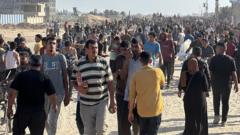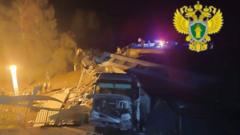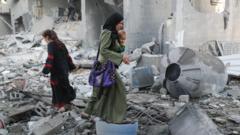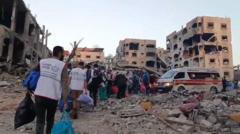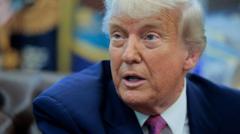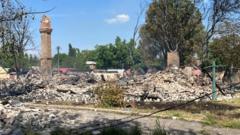Ukraine emphasizes the need for an unconditional ceasefire as essential to continuing dialogue with Russia.
**Ukraine Seeks Clarity on Russia's Peace Proposal Ahead of Talks in Istanbul**

**Ukraine Seeks Clarity on Russia's Peace Proposal Ahead of Talks in Istanbul**
Tensions remain high as the Ukrainian government awaits details from Russia before sending its delegation to anticipated peace negotiations.
Russia is preparing to send a delegation to Istanbul on Monday for a new round of peace discussions with Ukraine. Kremlin spokesperson Dmitry Peskov confirmed that Moscow is currently formulating its terms for a temporary ceasefire, which will be a focal point of the talks in Turkey.
While Ukraine remains open to dialogue, it has stated it will not dispatch its own delegates until it receives specific details regarding Russia's ceasefire proposal. The prior peace talks, which took place earlier this month between lower-level representatives from Russia and Ukraine, culminated in a significant prisoner exchange, marking the largest since Russia’s comprehensive invasion began.
Ukrainian Foreign Minister Andrii Sybiha expressed that Ukraine had already shared its vision for the next steps with Russia, insisting that an unconditional ceasefire must be accepted to facilitate further negotiations. Sybiha stated during a joint press conference with Turkish Foreign Minister Hakan Fidan, "We are keen to see these meetings continue because we want the war to end this year."
Should the upcoming talks proceed as planned, it is anticipated that neither Russian President Vladimir Putin nor Ukrainian President Volodymyr Zelensky will be present. Fidan conveyed Turkey's aspiration to eventually organize a high-level summit, suggesting that it might be time to bring together leaders like Trump, Putin, and Zelensky.
Peskov added that prospects for a high-level summit would depend on whether substantial progress is made in the initial discussions. He acknowledged remarks from Trump's envoy to Ukraine, retired General Keith Kellogg, who characterized Russian worries about NATO expansion as "fair" and noted that Ukraine's aspirations to join NATO were currently untenable.
In a related development, Germany’s newly appointed chancellor, Friedrich Merz, informed Zelensky that Berlin would assist in the production of long-range missiles for Ukraine to bolster its defenses against potential future Russian aggression. The Kremlin responded that lifting limitations on the types of missiles Ukraine could use would constitute a concerning shift in policy, detrimental to attempts to resolve the conflict.
Currently, Russia occupies approximately 20% of Ukraine's internationally recognized territory, including Crimea, which was annexed by Russia in 2014.





